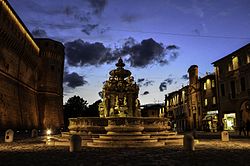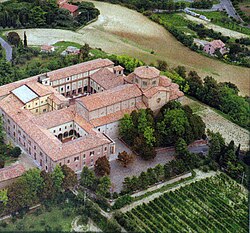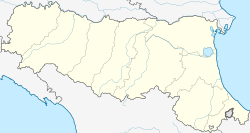Cesena (Italian: [tʃeˈzɛːna]; Romagnol: Cisêna) is a city and comune (municipality) in the Emilia-Romagna region of Italy; and - with Forlì - is the capital of the Province of Forlì-Cesena. Served by Autostrada A14, and located near the Apennine Mountains, about 15 kilometres (9 miles) from the Adriatic Sea. The total population is 97,137.
Cesena
Cisêna (Romagnol) | |
|---|---|
| Comune di Cesena | |
 Panorama of Cesena | |
| Coordinates: 44°08′20″N 12°14′40″E / 44.13889°N 12.24444°E | |
| Country | Italy |
| Region | Emilia-Romagna |
| Province | Forlì-Cesena (FC) |
| Frazioni | see list |
| Government | |
| • Mayor | Enzo Lattuca (PD) |
| Area | |
• Total | 249.47 km2 (96.32 sq mi) |
| Elevation | 44 m (144 ft) |
| Population (30-6-2017)[2] | |
• Total | 97,137 |
| • Density | 390/km2 (1,000/sq mi) |
| Demonym | Cesenate |
| Time zone | UTC+1 (CET) |
| • Summer (DST) | UTC+2 (CEST) |
| Postal code | 47521 - 47522, 47023 (old) |
| Dialing code | 0547 |
| Patron saint | St. John the Baptist |
| Saint day | June 24 |
| Website | Official website |





History
editCesena was originally an Umbrian or Etruscan town, later known as Caesena. After a brief spell under Gaulish rule, it was taken over by Romans in the 3rd century BC. It was a garrison town of strategic importance which was destroyed in the wars between Gaius Marius and Sulla. Pliny mentions the wines of Cesena as among the best.
Cesena was on the border that the Exarchate of Ravenna shared with the Lombards. It was presented to the Papacy by its Frankish conqueror in 754 (Donation of Pepin) and passed back and forth between the popes and the archbishops of Ravenna; it was also briefly a communal republic (1183–1198). It was then long contested between popes and Holy Roman Emperors. The brief rule by the Forlivese Ordelaffi was crushed in 1357 by Papal troops led by Cardinal Gil de Albornoz, after a long siege heroically endured by Cia degli Ordelaffi, wife of the Lord of Forlì.
The little comune revolted again in 1377 during the War of the Eight Saints. This time it was recaptured by Breton troops of Giovanni Acuto (the English-born condottiere John Hawkwood) under the command of Robert, Cardinal of Geneva (later antipope Clement VII). The latter, acting as the legate of Pope Gregory XI, directed the savage murder of between 2,500 and 5,000 civilians.[3] By the laws of war at the time, this was regarded as an atrocity, called the "Cesena Bloodbath", and Cardinal Robert was dubbed the "butcher of Cesena". The following year what remained of Cesena was assigned by the new Pope Urban VII to Galeotto I Malatesta.
During the period 1379–1465, the city recovered and prospered under the Malatesta, who rebuilt the castle (called Rocca Malatestiana) overlooking the town. The Malatestiana Library, built by near the castle by Malatesta Novello (1429), is considered a fine example of a Renaissance library and holds many valuable manuscripts.
After Novello's death (1465), Cesena returned to the Papal States, but was again seized by a local seignor, Cesare Borgia, in 1500. The city was elevated to capital of his powerful though short-lived duchy.
Cesena subsequently turned into a secondary city of the Papal States. In the 18th and 19th centuries Pope Pius VI and Pope Pius VII were born in the city, which also had Pope Pius VIII as bishop, gaining Cesena the title of "city of the three popes". During the Napoleonic Wars, it was stripped of numerous monasteries and churches. Some of its citizens had notable roles in the unification of Italy, in the second half of the 19th century.
During World War II, Cesena was near the Gothic Line, which ran along the Appennini near the city, and suffered heavily from bombing.
In 1992, it was elevated to the rank of co-capital of the province, together with Forlì.
On July 30, 2015, 1,000 people gathered at the Parco Ippodromo park in Cesena and performed "Learn to Fly" by the Foo Fighters to convince the band to perform there. The group, later known as the Rockin' 1000, was organized by Foo Fighters fans who played the guitar, bass, and drums in unison to a conductor. Dave Grohl responded with a video where he announced in Italian that the band would visit Cesena and perform there. The show was scheduled for November 3, 2015, at the town's indoor sports arena and concert venue, Carisport, becoming the kickoff date for their European tour.[4]
Main sights
editCesena's monuments include:
- Abbey of St Maria del Monte
- Malatestian Fortress (Rocca Malatestiana): built by Cardinal Albornoz (from 1380) over a pre-existing edifice which had hosted, among others, Frederick Barbarossa and his grandson Frederick II. It was completed by the Papal governor Lorenzo Zane in 1480, and was used by Cesare Borgia as jail for Caterina Sforza. It is octagonal, with two main towers, the higher maschio and the lower foemina
- Piazza del Popolo
- Malatestiana Library: first public library in Europe, listed in UNESCO Memory of the World Programme.
- Cathedral of Saint John the Baptist.
- Pinacoteca Comunale: housed in former Benedictine monastery.
- Art collection of Fondazione Cassa di Risparmio di Cesena: housed in the former Celestine monastery.
- Teatro Alessandro Bonci
- Palazzo Ghini.
- Church of Sant'Agostino
- Church and Convent dell'Osservanza
Economy
editThe main economic sectors in Cesena are:
- agriculture, in particular fruit and vegetables, and food processing
- manufacturing, in particular mechanics, agricultural and industrial equipment, construction equipment
- in the tertiary sector, banking and tourism.
Notable companies based in Cesena include:
- Technogym (fitness equipment)
- Soilmec (construction equipment)
- Olidata (computers)
- Cassa di Risparmio di Cesena (banking)
Transport
editCesena railway station, opened in 1861, forms part of the Bologna–Ancona railway. It is situated at Piazza Giorgio Sanguinetti, to the northeast of the city centre.
Neighbouring comuni
editPeople
edit- Monty Banks [Mario Bianchi] (1897–1950), Italian-born American actor, comedian and director
- Gregorio Babbi (1708–1768), operatic tenor
- Alessandro Bonci (1870–1940), operatic tenor
- Nicoletta Braschi (born 1960), Italian actress, best known for her work with her husband, actor and director Roberto Benigni
- Vincenzo Negrini (1804–1840), bass-baritone opera singer
- Marco Pantani (1970–2004), road cyclist
- Michael of Cesena (c. 1270–1342), Minister General of the Franciscans from 1316 to his deposition in 1329
- Pope Pius VI (1717–1799), pope from February 15, 1775, to August 29, 1799
- Pope Pius VII (1742–1823), pope from March 14, 1800, to August 20, 1823
- Scipione Chiaramonti (1565–1652), philosopher and opponent of Galileo
- Lorenzo Savadori (born 1993), motorcycle racer
- Obadiah ben Jacob Sforno, rabbi
- Alberto Sughi (1928–2012), Italian painter
- Lamberto Tacoli (1964), entrepreneur
- Giuseppe Palmas (1918–1977), photographer[5]
- Carlo Domeniconi (born 1947), guitarist and composer
- Nicky Hayden (1981–2017), Moto GP and Superbike pilot who died in Cesena on the 22nd March 2017
- Maurizio Ferrini (born 1953), comedian and actor
- Ubaldo Comandini (1869–1925), mayor and cabinet minister
- Federico Comandini, (1893–1967), politician
- Andrea Navarra (born 1971), rally driver
Frazioni
editAcquarola, Aie, Bagnile, Borello, Borgo di Ronta, Borgo delle Rose, Borgo Paglia, Botteghino, Budrio, Bulgaria, Bulgarnò, Calisese, Calabrina, Capannaguzzo, Carpineta, Casalbono, Casale, Case Castagnoli, Case Frini, Case Gentili, Case Missiroli, Case Scuola Vecchia, Celincordia, Celletta, Diegaro, Formignano, Gattolino, Gualdo, Il Trebbo, Lizzano, Luogoraro, Luzzena, Macerone, Madonna dell'Olivo, Martorano, Massa, Molino Cento, Monte Aguzzo, Monte Vecchio, Montereale, Monticino, Oriola, Osteria di Piavola, Paderno, Pievesestina, Pioppa, Ponte Abbadesse, Ponte Pietra, Pontecucco, Provezza, Rio Eremo, Rio Marano, Ronta, Roversano, Ruffio, Saiano, San Carlo, San Cristoforo, San Demetrio, San Giorgio, San Mamante, San Martino in Fiume, San Matteo, San Tomaso, San Vittore, Santa Lucia, Sant'Andrea in Bagnolo, Settecrociari, Tessello, Tipano, Torre del Moro, Trebbo, Valdinoce, Villa Calabra, Villa Casone.
Climate
edit| Climate data for Cesena (1991–2020) | |||||||||||||
|---|---|---|---|---|---|---|---|---|---|---|---|---|---|
| Month | Jan | Feb | Mar | Apr | May | Jun | Jul | Aug | Sep | Oct | Nov | Dec | Year |
| Mean daily maximum °C (°F) | 8.5 (47.3) |
11.0 (51.8) |
15.2 (59.4) |
19.0 (66.2) |
23.9 (75.0) |
28.6 (83.5) |
31.1 (88.0) |
31.0 (87.8) |
25.9 (78.6) |
20.4 (68.7) |
14.0 (57.2) |
9.1 (48.4) |
19.8 (67.7) |
| Daily mean °C (°F) | 5.2 (41.4) |
6.9 (44.4) |
10.9 (51.6) |
14.5 (58.1) |
19.2 (66.6) |
23.6 (74.5) |
26.1 (79.0) |
25.9 (78.6) |
21.2 (70.2) |
16.4 (61.5) |
10.7 (51.3) |
5.9 (42.6) |
15.5 (60.0) |
| Mean daily minimum °C (°F) | 1.9 (35.4) |
2.9 (37.2) |
6.6 (43.9) |
10.0 (50.0) |
14.4 (57.9) |
18.7 (65.7) |
21.0 (69.8) |
20.8 (69.4) |
16.5 (61.7) |
12.4 (54.3) |
7.5 (45.5) |
2.8 (37.0) |
11.3 (52.3) |
| Average precipitation mm (inches) | 43.1 (1.70) |
55.7 (2.19) |
58.6 (2.31) |
64.3 (2.53) |
64.4 (2.54) |
49.1 (1.93) |
34.4 (1.35) |
51.7 (2.04) |
74.6 (2.94) |
78.7 (3.10) |
83.3 (3.28) |
62.8 (2.47) |
720.7 (28.38) |
| Average precipitation days (≥ 1.0 mm) | 6 | 6 | 7 | 8 | 7 | 5 | 4 | 4 | 7 | 8 | 9 | 8 | 79 |
| Source 1: Arpae Emilia-Romagna[6] | |||||||||||||
| Source 2: Climi e viaggi (preciptiation days)[7] | |||||||||||||
See also
editReferences
edit- ^ "Superficie di Comuni Province e Regioni italiane al 9 ottobre 2011". Italian National Institute of Statistics. Retrieved 16 March 2019.
- ^ "Popolazione Residente al 1° Gennaio 2018". Italian National Institute of Statistics. Retrieved 16 March 2019.
- ^ Mallett, Michael (2006). Signori e mercenari - La guerra nell'Italia del Rinascimento [Mercenaries and their masters - The war in the Italian Renaissance] (in Italian). Bologna: Il Mulino. pp. 47–48. ISBN 88-15-11407-6.
- ^ Childers, Chad. "Foo Fighters to Honor 'Rockin1000' Italian Performers With Cesena Show". Loudwire. Retrieved 23 October 2015.
- ^ Palmas, R. "Giuseppe Palmas". Biblioteca Malatestiana. Retrieved 9 September 2015.
- ^ "Tabelle climatologiche". Arpae Emilia-Romagna agenzia prevenzione ambiente energia. Retrieved 30 June 2024.
- ^ "Clima - Cesena (Emilia Romagna)". Climi e viaggi. Retrieved 26 November 2024.
External links
edit- . Encyclopædia Britannica. Vol. 5 (11th ed.). 1911.
- Cesena home page (in Italian)
- Cesena history and info (in English)
- Forlì-Cesena tourism (in English)




